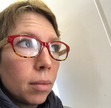KD Thompson's Blog, page 2
May 13, 2020
NEH Summer Stipend
 This summer I’ll spend two months working on the introduction and a book proposal for my third monograph, based on my ethnographic work with progressive Muslims, supported by a Summer Stipend from the National Endowment for the Humanities. My award was written up in a recent UW-Madison news piece that gives some more detail on the project.
This summer I’ll spend two months working on the introduction and a book proposal for my third monograph, based on my ethnographic work with progressive Muslims, supported by a Summer Stipend from the National Endowment for the Humanities. My award was written up in a recent UW-Madison news piece that gives some more detail on the project.
April 29, 2020
Voicing Queer Adjustments: My First Public Scholarship
 The Maydan invited me to write a layperson’s version of the article I have forthcoming in The Journal of Linguistic Anthropology. “Voicing Queer Adjustments in a Progressive Muslim Community” is now online. I presented an early version of this as a khutbah ‘sermon’ at El Tawhid Juma Circle in Toronto. I’m excited about having a version to which participants in my research can have easy access.
The Maydan invited me to write a layperson’s version of the article I have forthcoming in The Journal of Linguistic Anthropology. “Voicing Queer Adjustments in a Progressive Muslim Community” is now online. I presented an early version of this as a khutbah ‘sermon’ at El Tawhid Juma Circle in Toronto. I’m excited about having a version to which participants in my research can have easy access.
February 17, 2020
New publication in the Oxford Handbook of Language and Sexuality
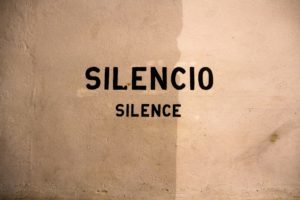 At long last, a chapter I co-authored with Olga Ivanova (who was several years ago now my doctoral student at UCLA in Applied Linguistics), “Religious Speech and Silence about Sexuality” has appeared in the online version of The Oxford Handbook of Language and Sexuality, edited by Kira Hall and Rusty Barrett.
At long last, a chapter I co-authored with Olga Ivanova (who was several years ago now my doctoral student at UCLA in Applied Linguistics), “Religious Speech and Silence about Sexuality” has appeared in the online version of The Oxford Handbook of Language and Sexuality, edited by Kira Hall and Rusty Barrett.
In this chapter, we explore silence about sexuality in religious communities, focusing on sexuality as religious taboo that necessitates silence and on innovative ways to talk about sex through uses of humor, indirect speech, vagueness, and euphemism. With bonus Popobawa data.
I’m not sure how long this will work, but the publisher provided temporary login for free access: Username: OUPAccess601 / Password: Deacon588
December 19, 2019
2019 Year in Review
Research
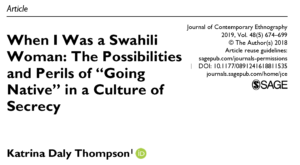 My article, “When I Was a Swahili Woman: The Possibilities and Perils of ‘Going Native’ in a Culture of Secrecy.” Journal of Contemporary Ethnography 48 (5): 674–99, which had been available online only in 2018, appeared in print in 2019. https://doi.org/10.1177/0891241618811535.
My article, “When I Was a Swahili Woman: The Possibilities and Perils of ‘Going Native’ in a Culture of Secrecy.” Journal of Contemporary Ethnography 48 (5): 674–99, which had been available online only in 2018, appeared in print in 2019. https://doi.org/10.1177/0891241618811535.Throughout the year, I continued working on my book manuscript on language and community among nonconformist Muslims in North America and online, with two more fieldwork trips to Toronto in June and September and one to San Francisco in December. UW-Madison nominated me for a Summer NEH fellowship to continue work on it in 2020.
I attended the American Association for Applied Linguistics in Atlanta in March, where I chaired and served as discussant on a panel on “Expanding Queerness: Developing Queer Practices for Language Teaching,” which I had co-organized with James Coda. I also got to hang out with former student Uju Anya and got to know Leslie Moore over lunch.
In April I gave an invited talk at the University of Kentucky. Later the paper I presented there served as the basis for an article accepted for publication in the Journal of Linguistic Anthropology. An early view of “Becoming Muslims with a ‘Queer Voice’: Indexical Disjuncture in the Talk of LGBT Members of the Progressive Muslim Community.” Journal of Linguistic Anthropology is now out at https://doi.org/10.1111/jola.12256.
In October I presented on the symbolic violence of ideological erasure of LGBTQ Muslims for the History department here.
I presented my research on queer language socialization among nonconformist Muslims at the American Anthropological Association in Vancouver in November and heard a lot of other great papers in linguistic anthropology.
Finally, I had an article accepted in the new Journal of Autoethnography and another in American Anthropologist. Look for those in 2020!
Teaching
In both Spring and Fall 2019, I taught my Critical Applied Linguistics (CALx) Working Group course for my doctoral advisees.
Two of them, Kazeem Sanuth and Adeola Agoke, finished up in Spring and Summer respectively. Dr. Kazeem Sanuth is now working in outreach at Indiana University, and my department hired Dr. Adeola Agoke to serve as Acting Director of the African Languages Program while I continue to chair the department.
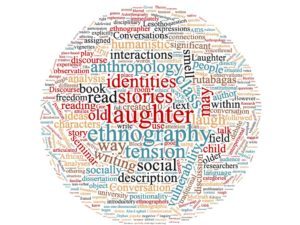 This semester I taught my Literary Ethnography seminar for a second time, this time cross-listed with Anthropology, which resulted double the number of students. I had 13 students from diverse departments—not just African Cultural Studies and Anthropology but also Sociology, Environmental Studies, and Curriculum & Instruction. The result was fantastic; I think they learned as much from one another and I from them as they did from me.
This semester I taught my Literary Ethnography seminar for a second time, this time cross-listed with Anthropology, which resulted double the number of students. I had 13 students from diverse departments—not just African Cultural Studies and Anthropology but also Sociology, Environmental Studies, and Curriculum & Instruction. The result was fantastic; I think they learned as much from one another and I from them as they did from me.
Service
In Spring 2019 I ran a successful search in my department and ended up hiring a wonderful new colleague, Jacqueline Bethel-Mougoué.
In February, I visited the University of Maryland’s Arabic Flagship program to get ideas about how to incorporate Arabic dialects into our program.
Since September, I’ve been taking part in the Big Ten Academic Alliance Academic Leadership Program, participating in monthly lunches with UW-Madison leaders and quarterly seminars at other Big Ten institutions. In October our first seminar took place at Michigan State University, focused on Contemporary Issues in Higher Education.
In October, I attended the annual meeting of the National Association of Self-Instructional Language Programs, my final meeting as a board member, in Birmingham, Alabama.
Finally, I continued chairing the Department of African Cultural Studies at the UW-Madison, work I’ve enjoyed.
December 3, 2019
New publication in the Journal of Linguistic Anthropology
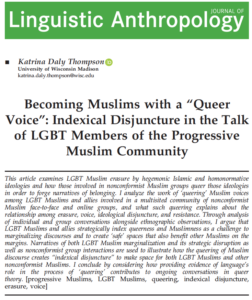 The online early view of my article, “Becoming Muslims with a ‘Queer Voice’: Indexical Disjuncture in the Talk of LGBT Members of the Progressive Muslim Community” is now available in the Journal of Linguistic Anthropology.
The online early view of my article, “Becoming Muslims with a ‘Queer Voice’: Indexical Disjuncture in the Talk of LGBT Members of the Progressive Muslim Community” is now available in the Journal of Linguistic Anthropology.
This article examines LGBT Muslim erasure by hegemonic Islamic and homonormative ideologies and how those involved in nonconformist Muslim groups queer those ideologies in order to forge narratives of belonging. I analyze the work of ‘queering’ Muslim voices among LGBT Muslims and allies involved in a multisited community of nonconformist Muslim face‐to‐face and online groups, and what such queering explains about the relationship among erasure, voice, ideological disjuncture, and resistance. Through analysis of individual and group conversations alongside ethnographic observations, I argue that LGBT Muslims and allies strategically index queerness and Muslimness as a challenge to marginalizing discourses and to create ‘safe’ spaces that also benefit other Muslims on the margins. Narratives of both LGBT Muslim marginalization and its strategic disruption as well as nonconformist group interactions are used to illustrate how the queering of Muslim discourse creates “indexical disjuncture” to make space for both LGBT Muslims and other nonconformist Muslims. I conclude by considering how providing evidence of language’s role in the process of ‘queering’ contributes to ongoing conversations in queer theory.
November 19, 2019
On Decolonizing African Language Programs
 Yesterday I served as a discussant for a panel on Re-envisioning African Studies in U.S. Universities, part of UW-Madison’s African Studies Program’s workshop on Decolonizing African Studies.
Yesterday I served as a discussant for a panel on Re-envisioning African Studies in U.S. Universities, part of UW-Madison’s African Studies Program’s workshop on Decolonizing African Studies.
My colleague Neil Kodesh, former director of our African Studies Program, spoke on the panel about African languages as potentially helping to decolonize African studies but mentioned that there are also strings attached because of Title 6 funding. I used my time as discussant to pull at some of those strings, arguing that our African language programs and, more broadly, our scholarly attitudes toward African languages, are actually as much in need of decolonizing as are the other aspects of African Studies. Speaking from my perspective as the director of UW-Madison’s African language program (and former director of UCLA’s), I asked, “Within African Studies, what is the role of African languages in decolonizing our endeavors?” Below I summarize what I said there, which I’ve also posted on Twitter.
An earlier keynote speaker, Professor Akosua Adamako Ampofu, offered us a to-do and not-to-do list. The first item was paying tribute to our forebears. In doing so, most of what we cite is in English, and to a lesser extent other colonial languages.
Relatedly, Professor Adamako Ampofu also encouraged us to increase access to our work beyond academic forums, such as writing for blogs (advice I’m trying to follow by posting this here); we need to disseminate our work in languages other than English as well.
Some might justify not citing African language scholarship with the argument that there just isn’t much of it. In other words, African languages are mostly for oral use. But if that’s the case, why are we teaching students mostly standard varieties of African languages? Standard varieties are mostly used in writing, while the messiness of nonstandard dialects, colloquial varieties, slang, and codeswitching better represent how African languages are actually used, and perhaps should be taught. The reasons they are not are related to the issues of epistemology and the devaluing of indigenous knowledge that were raised by our other keynote speaker, Professor Sabelo Ndlovu-Gatsheni.
Because we rely on Title 6, we are at the whims of a government that seems to care very little about Africa. Congress has been less supportive of Title 6 & Fulbright-Hays in recent years, & Trump’s budget request last year actually called for elimination of these programs.
As these funds are lessened, students and programs are becoming more reliant on Dept of Defense funding, such as the Boren fellowship, the University of Florida’s summer African language institute, or the Arabic and Swahili Flagships. Needless to say, Defense Department funding seems extremely problematic from the perspective of decolonizing what we do.
On the plus side, strong African language programs allow universities to admit and fund more graduate students with expertise in these languages, which means more African students in our programs (another to-do on Adamako Ampofu‘s list). This has been a real boon to my own department.
But as both a form and medium of indigenous knowledge, African languages are not as valued in the academy as other epistemologies, nor is pedagogical knowledge as valued as content knowledge, which translates into fewer and fewer academic positions in African languages for PhDs. The state of the job market thus disincentivizes our graduate students from gaining expertise in African languages and language pedagogy.
We also need to decolonize the language choices in our curricula. Even in programs that teach African languages, there is very little crossover into content courses. We need to teach material produced in African languages, even if we have to do so in translation.
I end with two final questions:
Is our use of African languages to gain Title 6 funding, fund our grad students, & enable our own research a form of extraction of African knowledge?
How might African language programs and scholarly engagement with African languages change if we decolonize?
November 14, 2019
Looking forward to AAA 2019 in Vancouver
 Next week I’ll be attending the American Anthropological Association convention in Vancouver, where I’ll be chairing and presenting on a panel called, “New Perspectives on Adult Language Socialization,” organized by Kathryn Mara. If you’ll be there, you can find us on Friday, 22 November, 8:00 AM – 9:45 AM (so early!), in Vancouver Convention Center WEST | Ballroom B | West Level 1. I’m especially proud to be joined not only Kathryn, one of my current graduate students, but also my former student, Dr. Kazeem Sanuth. The esteemed language socialization scholar Patsy Duff will be our discussant.
Next week I’ll be attending the American Anthropological Association convention in Vancouver, where I’ll be chairing and presenting on a panel called, “New Perspectives on Adult Language Socialization,” organized by Kathryn Mara. If you’ll be there, you can find us on Friday, 22 November, 8:00 AM – 9:45 AM (so early!), in Vancouver Convention Center WEST | Ballroom B | West Level 1. I’m especially proud to be joined not only Kathryn, one of my current graduate students, but also my former student, Dr. Kazeem Sanuth. The esteemed language socialization scholar Patsy Duff will be our discussant.
My paper is titled, “Queering Language Socialization: Fostering Progressive Muslim Interpretations through Talk-in-Interaction.” How do Muslims in progressive Muslim communities of practice socialize newcomers into “queer” ways of practicing and talking about Islam? I address this question through a multi-sited ethnography of progressive Muslim face-to-face and online groups (mainly in North America), including both participant observation and ethnographic interviews. In mainstream approaches to Islam, homosexuality is considered forbidden, yet there have always been sexually and gender diverse Muslims (Kugle 2010; Hamzić 2016). Discussing child language acquisition, Barrett (1997, 191) argues that “queer language is probably highly divergent from the language we are socialized into using,” yet little work has examined how queer communities might socialize one another through or into queer language as adults. Ethnographic work on the language use of sexually and gender diverse Muslims, though limited, has demonstrated that such communities do develop unique ways of talking both about their subjectivities and about Islam (e.g. Gaudio 2009). Over the last decade, an increasing number of progressive Muslim groups and congregations have formed throughout the world, communities of practice in which sexually and gender diverse Muslims are fully included. A language socialization approach enables us to see how participants in such groups talk about Islam and teach others to do so in ways that resist homophobic interpretations, creating a welcoming environment for not only sexually and gender diverse Muslims but for a variety of minoritized subjectivities. In this context, we see that even resistance involves socialization.
You can access my slides and some notes in advance, or afterward, through Google Drive.
See you in Vancouver?
October 24, 2019
Join me in African Cultural Studies at UW-Madison
My department is hiring! If you’re interested in chatting more about the position, I will be available in Vancouver during the American Anthropological Association’s annual meeting, 19-23 November. My colleague Vlad Dima, co-chair of the search committee, will be available to meet with potential applicants at the African Studies Association meeting in Boston during the same time period.
September 20, 2019
NEH Summer Stipend Nominee
 I am one of two UW-Madison faculty selected for nomination to the National Endowment for the Humanities (NEH) summer competition for my project, “A Multi-sited Ethnography of Muslims on the Margins in North America and Online.”
I am one of two UW-Madison faculty selected for nomination to the National Endowment for the Humanities (NEH) summer competition for my project, “A Multi-sited Ethnography of Muslims on the Margins in North America and Online.”
As a UW-Madison nominee, I’ll receive summer salary support in 2020 that will enable me to spend two months developing a book proposal for Muslims on the Margins, my third ethnographic book project.
The book tells the story of a multi-sited community coalescing around creative (re)interpretations of the Qur’an, critical questioning of taken-for-granted Muslim norms, and radical inclusion of those who are ‘queer’ in various ways. As humanizing research, my ethnographic and sociolinguistic approach centers on the voices and interpretations of queer (LGBT and gender-nonconforming) Muslims and their allies collected over a 45-month period in North American face-to-face and international online groups that label themselves “progressive” or “inclusive.” By examining how these eclectic participants form small and large-scale communities, learn and teach one another the linguistic, social, and embodied norms of these communities, and find meaning in their practices, Muslims on the Margins will lead to deeper understanding of Muslim diversity, overturn stereotypes that claim Islam and queerness are incompatible, and encourage appreciation for both similarities and differences among Muslims and between Muslims and others.
September 11, 2019
History Department Colloquium on Gender & Violence
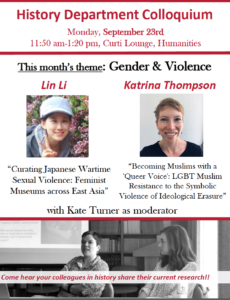 Join me on Monday 23 September 2019, when I’ll be taking part in the UW-Madison History Department’s colloquium on “Gender & Violence.”
Join me on Monday 23 September 2019, when I’ll be taking part in the UW-Madison History Department’s colloquium on “Gender & Violence.”
My presentation is titled, “Becoming Muslim with a ‘Queer Voice’: LGBT Muslim Resistance to the Symbolic Violence of Ideological Erasure.”
Based on ethnographic research in a multi-sited nonconformist Muslim community, the paper examines LGBT Muslim erasure by dominant Islamic and homonormative ideologies, how LGBT Muslims queer those ideologies in order to forge narratives of belonging, and what such queering explains about the relationship among erasure, symbolic violence, and resistance.

